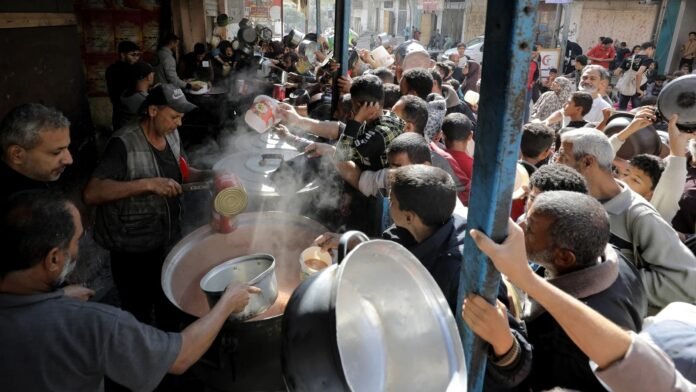The Humanitarian Crisis in Northern Gaza
The humanitarian situation in Northern Gaza has reached alarming levels, largely due to the ongoing conflicts that have exacerbated the already dire circumstances facing the civilian population. Recent assessments from humanitarian experts indicate that the region is on the brink of a catastrophic famine, posing an imminent risk to countless lives. The relentless violence has led to the destruction of critical infrastructure, severely limiting access to essential services such as healthcare, sanitation, and most importantly, food and water.
International Humanitarian Law and Accountability
The ongoing conflict in Gaza has significant implications for international humanitarian law (IHL), as it raises serious concerns about potential violations committed by various parties involved. Fundamentally, IHL is designed to protect individuals who are not participating in hostilities and to regulate the means and methods of warfare. Allegations have surfaced against both Israeli forces and Palestinian armed groups regarding violations of these principles, particularly in terms of protecting civilians and civilian infrastructure during military operations.
One of the critical issues highlighted by the current situation is the conduct of military operations in densely populated civilian areas. The principle of distinction is central to IHL, which mandates that parties to a conflict must always distinguish between combatants and non-combatants. Failure to adhere to this principle can lead to indiscriminate attacks, resulting in excessive civilian casualties and suffering. Moreover, the use of starvation as a method of warfare is strictly prohibited under international law, yet allegations have emerged suggesting that both sides have engaged in actions that could be construed as utilizing starvation as a weapon against civilians, thus violating these established norms.
Accountability for violations of IHL is imperative to ensure justice and to deter future misconduct. This necessitates a thorough investigation into the actions of all parties involved in the conflict. Notably, vital international resolutions, including those from the United Nations, emphasize the need for compliance with humanitarian principles during armed conflicts. The international community, therefore, has a responsibility to monitor the situation closely and to hold accountable any party that flouts these obligations. Accountability mechanisms are essential to uphold the rule of law and to restore the rights of affected populations, making it paramount to address these allegations swiftly and effectively.
Role of the United Nations and Global Response
The humanitarian crises in Gaza have prompted urgent attention from various international bodies, notably the United Nations Security Council (UNSC). In response to the deteriorating situation, an emergency meeting was convened recently to assess the conditions facing the population of Northern Gaza. This meeting sought to address the immediate needs arising from ongoing conflicts and the resulting humanitarian challenges, including the threats of famine. The discussions emphasized the critical importance of achieving a ceasefire to facilitate necessary humanitarian access, allowing aid organizations to deliver essential supplies to those in desperate need.
Joyce Msuya, Assistant Secretary-General for Humanitarian Affairs, highlighted the dire circumstance that millions in Gaza face and underscored the necessity for member states to exercise their influence to ensure adherence to international humanitarian law. She conveyed the importance of swift actions that can alleviate human suffering, calling upon nations to initiate and support lasting solutions that prioritize the welfare of civilians. The recent appeals made during the meeting underscore the collective responsibility of the global community to respond effectively to the crisis.
In addition to the UNSC’s efforts, other international organizations and humanitarian entities are mobilizing resources to address the escalating needs within Gaza. Various non-governmental organizations have reported an increase in their operations in the region, working tirelessly to provide medical assistance, food aid, and basic necessities. The international response is pivotal in ensuring that humanitarian efforts are not impeded and that access to those in need is prioritized. By fostering cooperative engagements among nations and humanitarian actors, there is a potential path toward alleviating the impending famine and restoring adequate living conditions for the people of Northern Gaza.
The Path Forward: Diplomatic Solutions and Humanitarian Aid
Addressing the burgeoning crisis of famine in Northern Gaza necessitates a multifaceted approach that integrates sustained humanitarian aid with robust diplomatic initiatives. Central to alleviating the dire circumstances faced by the population is ensuring unimpeded access to essential humanitarian assistance. This includes the provision of food, clean water, medical supplies, and other critical resources that are vital to the survival of the affected communities. Humanitarian corridors must be established and respected, allowing aid to reach those in desperate need without interference.
Moreover, the restoration of essential services such as healthcare, sanitation, and education is crucial for fostering resilience within the population. International actors must prioritize these services to build a foundation for stability and recovery. The uninterrupted flow of assistance is vital not just for immediate relief but also for the long-term rebuilding of social infrastructure in Northern Gaza.
Alongside humanitarian efforts, diplomatic solutions are equally imperative. The international community must unite to address the root causes of the ongoing conflict, which contribute to food insecurity and violence. This involves facilitating dialogue between conflicting parties, advocating for ceasefires, and encouraging negotiations that prioritize the well-being of civilians. Diplomatic channels must remain open and active, ensuring that peace discussions are ongoing and that the humanitarian needs of the population are acknowledged.
Furthermore, ongoing monitoring and assessment by international organizations can play a pivotal role in addressing food security concerns. By working collaboratively, nations and organizations can implement effective interventions that not only provide immediate relief but also foster an environment conducive to lasting peace and stability. The engagement of all stakeholders—local leaders, international bodies, and humanitarian organizations—will be essential in orchestrating these efforts.


